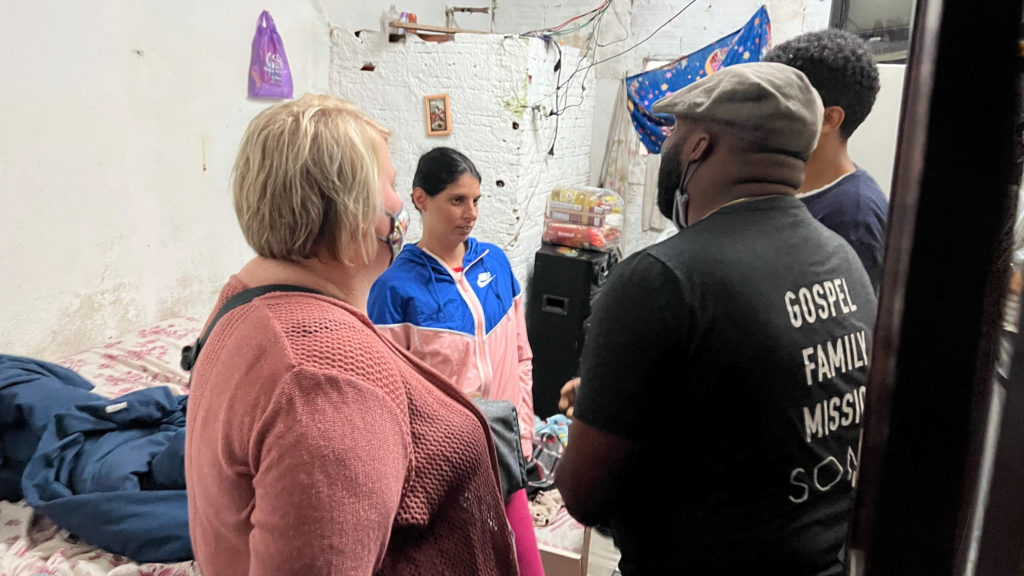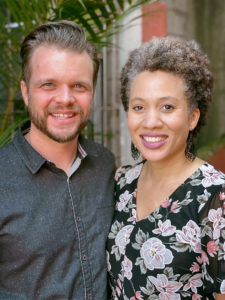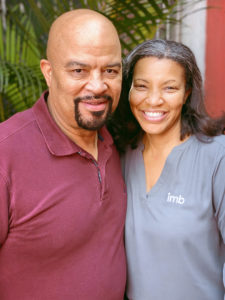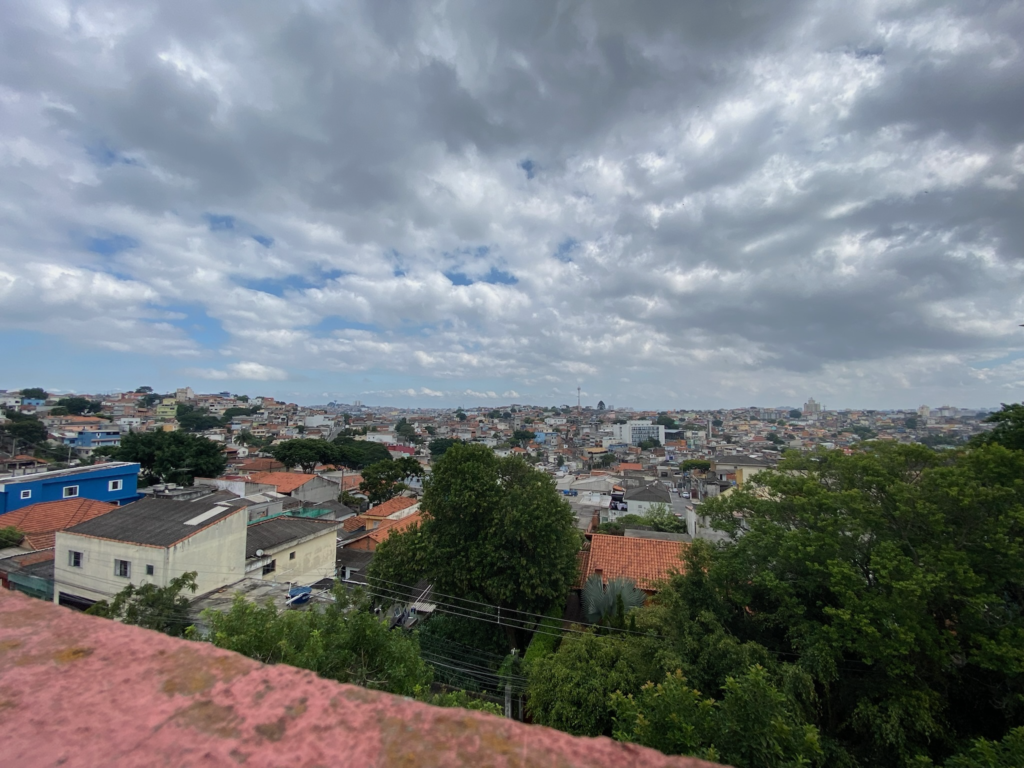A group of International Mission Board missionaries and leaders from Historically Black Colleges and Universities (HBCU) walked into a community in São Paulo, Brazil. IMB missionary Aaron Stormer described this area as the worst neighborhood he’s ever seen. Open sewage ran under the thin flooring in each house, Aaron said, using the term “house” loosely.
Aaron and his wife Melissa led the mission team alongside IMB missionaries Eric and Ramona Reese, who have served in Brazil since November 1999. Participants from Lincoln University in Jefferson City, Missouri, included Jon and Heather Nelson, the pastor and pastor’s wife at SOMA Community Church and campus ministers at Lincoln University. Other participants included leaders from the University of Arkansas Pine Bluff.

Jon and Heather Nelson visit inside a basic home in the community they visited. IMB Photo
Julia Baird, an IMB NextGen mobilization strategist, also accompanied the team in São Paulo for the vision trip.
The team’s purpose for being in the community, known locally as a “favela,” was to share hope and the gospel. IMB leaders also wanted the team to experience the sheer need in the city and see tangible ways they could fit into the work God is doing there through the IMB.
Another thing the trip accomplished was strengthening the partnership between these two HBCUs and the IMB. This newly formed partnership will help create a pipeline for mobilizing students from these schools to the nations through the IMB. The vision shared by this team, IMB NextGen leaders and the leaders from the HBCUs is that students will be funneled from these schools to the team in São Paulo – through one of the IMB’s student pathways for years to come.

Aaron and Melissa Stormer. IMB Photo
“We want campus ministers and students to know that they have a part to play in getting the good news of the gospel to the nations,” Baird shared. “In the same way that we intentionally engage our Baptist campuses and universities and our collegiate engaged churches, we want to be sure to engage all of our Baptist Campus Ministries as well.”
Baird continued, “Often the only barrier to students going on a mission trip is not having the knowledge that they CAN go. We want to remove that barrier for all students who feel called to serve internationally.”
Getting a close-up view of the city, the leaders stood at the top of the skyscraper Farol Santander. They observed the scope of the city, seeing more than one can see from the Empire State Building in New York City. As they interacted with the missionary team and their colleagues, the HBCU team was introduced to specific areas they and their students could fit in God’s mission in São Paulo.
But one thing that made this group unique was that, mostly, they weren’t unique, at least in initial appearance. As they toured and ministered, the group, comprised mostly of African Americans, blended in with the dark-skinned Brazilians.
This was a relatively new experience for the team, the missionaries recounted. In fact, Eric and Ramona, who graduated from Albany State University in Georgia, an HBCU, remember the first Black student missions volunteer they received on their team. His name is Ben, and he came as a Hands-On missionary in 2008. That was nearly 10 years after the Reeses had begun their ministry in São Paulo.
Since investing in Ben and keeping up with him as he started a family and serves the Lord in the United States, the Reeses have seen the lasting impact that missions in São Paulo can have on an African American student, and the lasting impact students can have on their ministry.
Partnerships like this build a pipeline of HBCU students and IMB efforts like it, have been a “long time coming,” Eric commented.
“These people look like some of the folks I know back home,” one of the vision trip participants shared with Eric.

Eric and Ramona Reese. IMB Photo
Both the Reeses, who are a Black couple, and the Stormers, who are an interracial Black and White couple, have found this to be an aid to their ministry, breaking down barriers that sometimes exist in cross-cultural, cross-racial missions.
They see a cultural identification between some of the people they serve and the culture they grew up in, the Reeses noted.
Coming in with a group that looked like the people they serve, especially when street ministry is happening, “they are less guarded. Walls are broken down,” Melissa noted. “When the team was here, there was none of that,” Melissa said, referring to the caution that many people feel toward strangers.
Melissa added, “I felt like this team had access to people on a whole other level.”
The groups they shared and interacted with were more open. “It went both ways, with the people who came on the trip and with the Brazilians who were here.”
Aaron observed, “It was someone who looked like them, sharing life with them, saying, ‘Let me tell you about my friend Jesus.’”
With less than 1% of evangelical missionaries being African American, IMB leadership recognizes how imperative it is that Southern Baptist Convention Black churches connect with the mission to reach the nations, together. The IMB has made that a focus in recent years, but specifically by adding an African American Church mobilizer to the team, Jason Thomas.
But Melissa is quick to point out that the work God is doing in São Paulo isn’t just open for African Americans to join. The larger IMB team in São Paulo is multicultural, showcasing the heart of the IMB to involve every Southern Baptist of every race or ethnicity in the Revelation 7:9 vision.
IMB President Paul Chitwood said, “We highly value our Baptist Campus Ministries across the U.S. and their partnership with the IMB to prepare students for the mission field, both short-term and as part of the next generation of career missionaries.”
Chitwood continued, “We are especially thrilled to host a growing number of African American student missionaries and student missionaries from other ethnicities because we have seen how they can make a unique contribution to the Revelation 7:9 vision, where a great multitude from every nation, all tribes, peoples, and languages will stand before the throne and the Lamb.”

The vision team went into communities, but they also surveyed the city from a skyscraper, getting the vision for just how big the need is in São Paulo. IMB Photo
Participants from these HBCUs experienced, even for a short time, what life is like as a missionary. They saw the city and they learned how to contextualize ministry. The Reeses and the Stormers were encouraged at the hope of more students from HBCU schools getting involved in their ministry in São Paulo. And for the people they serve, they were given the hope of the gospel by a team that broke down cultural and racial barriers.
Are you a young adult wanting to learn more about how you can go? Visit www.imb.org/nextgen to explore the next steps. Want more info about mobilizing your campus ministry or church to the nations? Contact info@imb.org. Learn more about pathways the IMB offers to get to the field.

